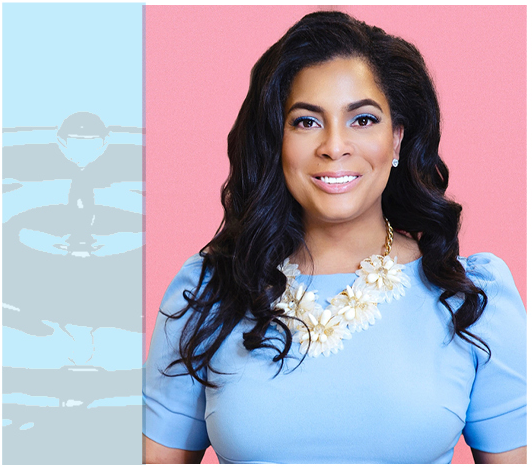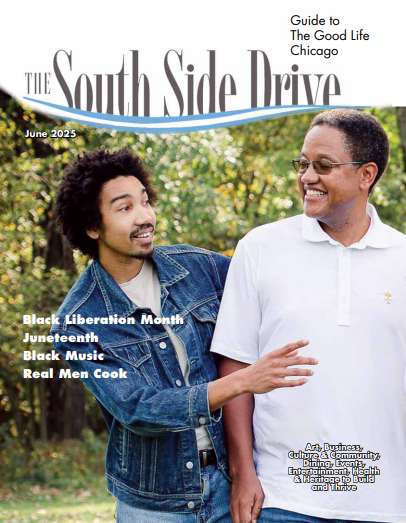The Metropolitan Water Reclamation District of Greater Chicago (MWRD) has been keeping our waterways clean since it was first established in 1889 Although it has a history of excellence and has won a couple of awards to prove it including the WEF Water Quality Improvement Award and the Schroepfer Innovative Facility Design Medal, consumers don’t know much about this agency, and often get it confused with the Chicago Department of Water. There are nine commissioners on the board of MWRD, and for Woman’s History Month, we chose to highlight the three African American women of MWRD, President, Kari Steele: Commissioner Precious Brady-Davis and Commissioner Yumeka Brown.
President Steele, who is the daughter of retired Appellate Court Judge and former 6th Ward Alderman, John Steele, was elected to her first term as a Commissione of MWRD in 2012. President Steele, who is a chemist and environmentalist was re-elected in 2018 for a second term and in January 2019, she became the first African American woman in the more than 130-year history of the MWRD to be elected by the Board of Commissioners to serve as President. She is currently serving her third term as President of the Board of Commissioners.

Commissioner Brady Davis
President Steele tells us that her motivation to go into politics came mostly from her father. “As a young girl, my dad provided a depth of leadership knowledge and a wealth of expertise in being a public servant,” she tells us. At first reluctant and with no plan in mind, at an early age, of becoming an elected official, she attended community meetings and volunteered for activities organized by her father. “I passed out literature, stuffed envelopes and sat in community meetings, listening to residents’ concerns on various issues,” she says. During her volunteer work she met a person whom she refers to as one of her most diligent and knowledgeable mentors, former Alderman Fredrenna Lyle, who asked young Kari Steele to revitalize the 6 th Ward Young Democrats. “That’s when I got involved in a leadership role,” she tells us, “I became the chair of the group and hosted activities and asked my friends to be involved.” From there, she joined the Cook County Young Democrats (CCYD), became the Chair of that group and was active with the Young Democrats of Illinois. She says, “Politics quickly became my extracurricular activity.”
President Steele tells us that during her college years, she volunteered for Marc Morial, “Because I wanted to be part of the process that supported a Black man’s run for mayor,” she explained. “That was the first action where I stepped out on my own and it reminded me of the people who supported former Chicago Mayor Harold Washington.” Politics became a part of President Steele’s life from an early age. “My life has always been close to the community and the elected officials responsible for resolving their constituents’ concerns,” she says, adding, “Today, I am standing in the shadows of prominent politicians who have provided excellent guidance and who now hold me accountable for the actions and services I provide to the communities we serve.”
She earned a pre-med degree in Chemistry from Xavier University in Louisiana, and worked as an intern at the MRWD, so choosing water was an easy decision. In addition, she held several positions working in Houston for a water testing company and working in Chicago as a control lab water chemist for six years at the Chicago Department of Water Management Jardine Purification Plant near Navy Pier.
She also held a position at L’Oreal as a formulating chemist for ethnic hair care products.
A turning point in her trajectory came when she was attending a community meeting. “A major issue came up concerning Southside residents who were experiencing major basement water backups and I found myself stepping forward and giving feedback about the role of the Metropolitan Water Reclamation District and the City of Chicago Water Department to help homeowners.”

Commissioner Yumeka Brown
She says that doing that triggered her to take a leap of faith to further educate people on the essential work of the MWRD. At the urging of many of her peers and supporters, she ran for the MWRD Commissioner in 2012 and the rest is Her Story.
For Commissioner Precious Brady-Davis, the 2016 U.S. Presidential election was not only a historic moment in American history, but a wake-up call for her. She notes that former President Trump won by mobilizing coal country. “I couldn’t sit back on the sidelines of history as Trump determined to rescind vital environmental protections,” she explained. “Being a Black Trans woman, witnessing the unrelenting legislative assault on LGBTQ+ Americans, I feel we need more people like me contributing to policy and government. Our queer, trans, Black and brown voices and perspectives are essential to creating an equitable system.”
Growing up in Nebraska, Commissioner Brady-Davis says she has always been deeply drawn to nature, the environment and water. “Over the past six years I have served as the Associate Regional Communication Director at Sierra Club, leading campaigns that champion renewable energy, hold corporate polluters accountable and fight climate change,” she says and adds, “I strongly believe in protecting Lake Michigan, our primary source of drinking water, as water is our most precious resource.”
Commissioner Yumeka Brown says at first, she never thought she would be in politics, however the environment she grew up in changed that. “Growing up in the Roseland community really shaped my views on “no community left behind,” she says. “The drive to make a substantial difference in the lives of marginalized, disproportionately impacted communities propelled me into politics.” She adds that, “Witnessing the challenges our residents face daily and having the opportunity to advocate for positive change, fueled my desire to serve.” To Commissioner Brown, “It is about contributing to a legacy that empowers and uplifts every individual in every community.”
Commissioner Brown chose water to focus on in politics because as she states, “Clean and safe water is a fundamental right, not a privilege. It intersects with public health, environmental justice, and economic fairness.” On a more personal basis, she tells us, “My son’s battle with blastomycosis (an infection caused by a fungus called Blastomyces) due to water issues fueled my commitment to ensuring equitable access to this vital resource for all families. This personal experience shaped my dedication to public service and policy advocacy, driving me to fight for the health and well-being of our community with urgency and determination.”
These three women are doing their part to protect our waterways, and they urge us, as consumers to do our part. “We at MWRD encourage Cook County residents to reduce their water use to necessity when there is a heavy rainfall so that the local sewers are not overwhelmed,” says President Steele, as she advises residents to take shorter showers, wait to run the dishwasher, and delay using the washing machine during heavy rainfalls.”
Clean water is such an essential necessity, it’s great to know that we have these competent, well-qualified women, who really, really care, protecting our waterways.







